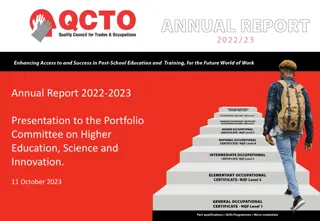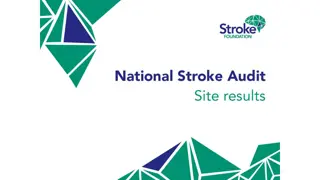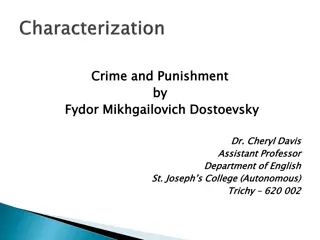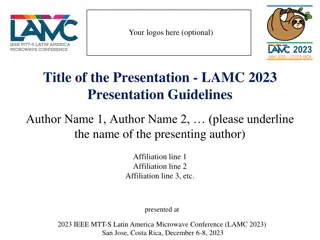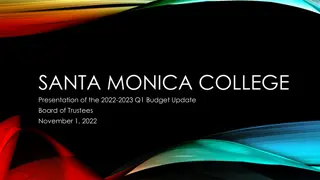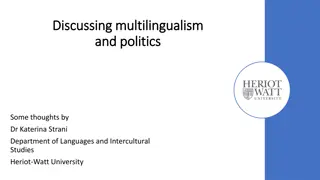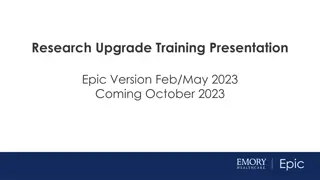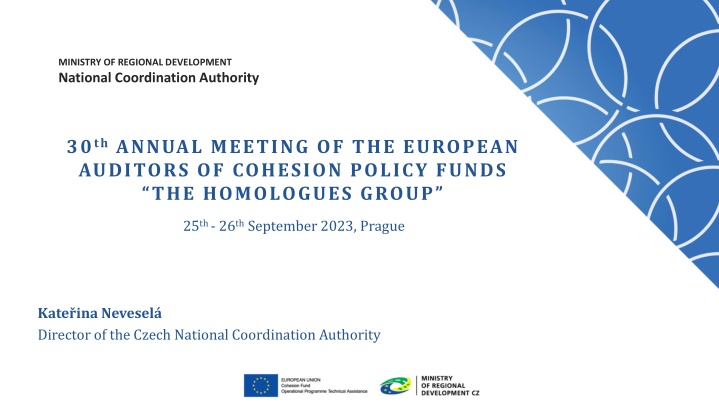
Simplifying Audit Procedures in Cohesion Policy Funds for Enhanced Efficiency
Explore the drive for simplification in European Auditors' audit procedures for Cohesion Policy Funds, with a focus on the challenges and advancements in the Czech National Coordination Authority. Topics include streamlined verifications, increased use of SCOs and FNLC, and the introduction of DNSH and climate proofing. Discover the ongoing efforts to balance simplification with compliance, paving the way for smoother auditing processes ahead.
Download Presentation

Please find below an Image/Link to download the presentation.
The content on the website is provided AS IS for your information and personal use only. It may not be sold, licensed, or shared on other websites without obtaining consent from the author. If you encounter any issues during the download, it is possible that the publisher has removed the file from their server.
You are allowed to download the files provided on this website for personal or commercial use, subject to the condition that they are used lawfully. All files are the property of their respective owners.
The content on the website is provided AS IS for your information and personal use only. It may not be sold, licensed, or shared on other websites without obtaining consent from the author.
E N D
Presentation Transcript
MINISTRY OF REGIONAL DEVELOPMENT National Coordination Authority 30thANNUAL MEETING OF THE EUROPEAN AUDITORS OF COHESION POLICY FUNDS THE HOMOLOGUES GROUP 25th- 26thSeptember 2023, Prague Kate ina Nevesel Director of the Czech National Coordination Authority
Is there a real simplification in audit procedures?
Simplification in CPR 2021-2027 CPR 2021-2027 pursues enhanced simplification , e.g.: extended use of SCOs and FNLC - reduce bureaucracy linked to verifications and the risk of errors verifications linked to deliverables and results more proportionate approach to audits and single audit arrangement New elements introduced: DNSH and climate proofing for all projects brought uncertainty!
SCOs and FNLC flagship of simplification broader use is continuously supported by the Commission and ECA increased number of Czech programmes applying the SCOs (from 3 to 7) and increased allocation of Funds financed based on SCOs major no expenditures, invoices, public procurement documentation is recorded and verified simplification in the area of verifications and audits: BUT inconsistency among rules of CPR denying the simplification brought by SCOs still exists = evidence of detailed data!
SCOs compliance with applicable law? no need to verify public procurement, but: not possible to support beneficiaries/suppliers on sanction lists conflict of interest must be respected there is uncertainty about how to ensure these requirements are met: by fact checking? where is the simplification for all the authorities involved? is it possible to carry out an audit work if there is no control of public procurement but compliance with the above-mentioned conditions must be checked? How to set up the new legislative rules according to the best practice = cooperation with AAs needed. 5
Climate proofing and DNSH new instruments introduced in 2021-2027 period commission issued guidance in a late stage MAs face obstacles for timely anchoring of this principle in their rules and processes implementation in the member states differs in some burden is passed on to the applicants and beneficiaries What will be the approach of audits as regards these new elements? Proportional or strict, coordinated between MSs or tailor made? Will be this period perceive as a pilot proofing only?
Recovery and Resilience Fund inspiration? new instrument based on performance payments are made to Member States when milestones and targets have been satisfactorily fulfilled legality and regularity based on their achievement still (e.g. public procurement, state aid rules, EIA, ) investment projects must comply with EU/national rules financing similar to Financing not linked to costs implemented in CP How to set up a proper simplified control and audit system respecting the performance-based financing? Is there a significant difference between controls/audits in RRF and cohesion funds?
What about the future? discussions about the future of cohesion policy post 2027 have already started important to reflect on the current practice with audit procedures and a possible further simplification of legislative rules single audit approach proved to be successful? Important to base the future set up of the legislation on the best practice from previous periods and other instruments = goal is to have a simplified and consistent set of rules. Please join this activity support the work of the EC in the preparation of the new programming period. with your know-how and
Thank you for your cooperation up to now and in the future

